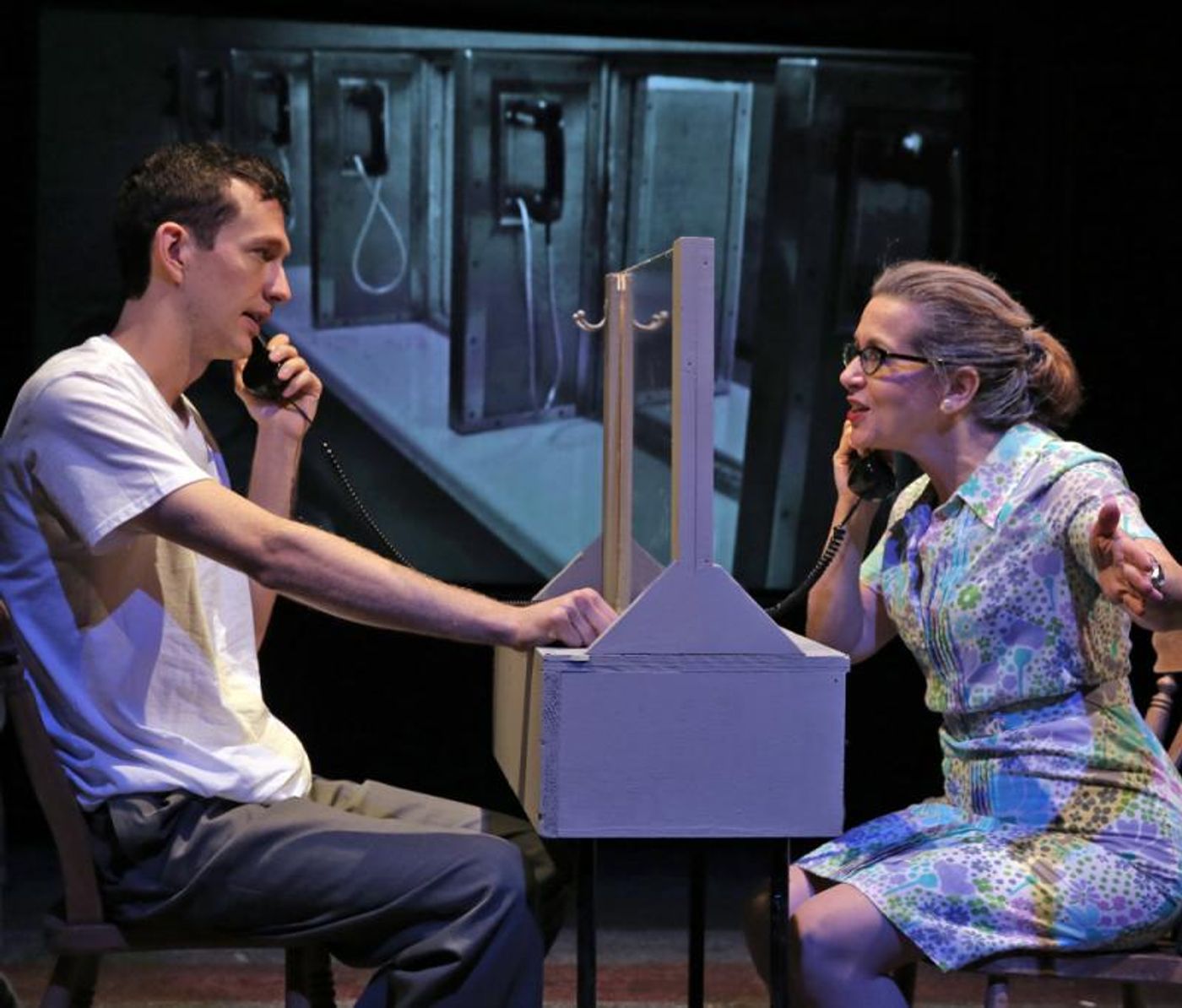Interview: In Mothballs and Treading Water: Good Theater and MSMT Share Survival Strategies
Good Theater and MSMT Share Survival Strategies

"At Good Theater we have put ourselves in mothballs, declares Executive/Artistic Director Brian P. Allen. Maine State Music Theatre's Artistic Director Curt Dale Clark concurs, " For me the hardest part is the feeling of treading water."
"My Grandfather taught me that life was a staircase," Clark recounts. "He would say,'  Always make sure you are moving forward; if you have to stay on a step for a while, no big deal. Try not to take a step backwards, but if you have to, figure out why, fix it, and keep moving forward.' Right now," Clark says sadly, "it does not feel possible to keep climbing. Everything is stacked against us and all the people we need to help us."
Always make sure you are moving forward; if you have to stay on a step for a while, no big deal. Try not to take a step backwards, but if you have to, figure out why, fix it, and keep moving forward.' Right now," Clark says sadly, "it does not feel possible to keep climbing. Everything is stacked against us and all the people we need to help us."
On a brisk fall day nine months into the pandemic the two are taking a moment to share their experiences in this unprecedented time of crisis - a crisis that has shuttered their theatres and forced them to engage all their energies in survival of the institutions and the art form they love.
These two men, prominent forces in Maine's professional theatre community, represent two poles of the theatre spectrum here. Both not-for-profits, MSMT is a large organization with a 63 year history, a 600-seat performance space at the Pickard Theater on Bowdoin College's campus, and a $5.1 million budget. The Good Theater has been existence 18 years, leases from Portland's St. Lawrence Center a 100-seat space, and has a budget one-sixteen in size. Yet both now face the same challenges of keeping their theatres viable and in readiness to come back when re-opening is possible.
Both the Good Theater and MSMT have had to cancel their entire seasons, leaving them with no direct revenue for 2020-2021. Fundraising has been of extreme importance. Allen says the response to his requests has been strong: "We have raised twice what we hoped."
Clark says MSMT's launch of its Lifeline Fund has been brought a heartening response with 33% of ticket holders donating their tickets back and patrons making additional monetary contributions to sustain the theatre. He adds that two-thirds of the MSMT subscribers have already renewed for 2021. "When people tell me how excited they are for next season, I say 'Will you pray with me right now?' Because nothing is certain."
Not only have both artistic directors had to ask for increased donations, but they have had to navigate the complex waters of government and grant funding and implement a wide array of cost-cutting measures. Both pay rent and do not own their performance spaces. Allen says Good Theater's overhead includes continuing rent to the St. Lawrence Center, albeit at a reduced rate, insurances, and other overhead costs. MSMT must maintain its offices, rehearsal studios and shops - which the company does own in the 29,000 square foot building at 22 Elm Street - in addition to five other Brunswick properties used for artist housing.
Clark explains that "whereas in the past, if repairs or maintenance were needed, we had a budget line for this, now we pitch in and do it ourselves." He notes that this summer he and Production Manager Kyle Coyer handled all the landscaping and property maintenance themselves. "Very early on, someone said to me, 'This is not my job,' and I said, 'All our job descriptions have been readjusted for now.'"

Good Theater had to lay off its small staff at the onset, though Allen says he now hopes to bring back his Box Office Manager and valued assistant by year-end. Thus far, MSMT has had to let go one part time member of its small Annual Staff and place everyone else on half time/half pay. This detrimentally impacts the theatre's ability, as it goes forward, to produce - hopefully - a 2021 season.
Both companies availed themselves of the Paycheck Protection Program at the start of the pandemic. Allen reports with relief that his loan was almost completely forgiven this week, while Clark notes that the rules were so unclear and complicated that MSMT was advised to request only $219,000, which has by now long since run out. "Had we known most of it would have been forgiven, we would have requested a more practical amount to cover our needs." He is, however, more optimistic than Allen that the U.S. Congress will implement a second relief package in the new year. "I just hope they set up the same rules, so we go into it with a clearer understanding."
MSMT also received a very small stipend from the State of Maine from the CARES money distributed to the states, but, as Clark says, "$100,000 is a drop in the bucket for a theatre the size of MSMT. It does not move the needle at all in our current situation." Clark and other Maine theatre leaders (among them Ogunquit Playhouse, Portland Stage, Penobscot Theatre) have formed a committee to lobby the Maine legislature for crucial assistance, stressing not only the immediate need for more funding, but the need for "equity rather than equality" in distributing those funds.
But besides the constant imperative to pursue funding - "I feel as if I am begging on steroids," says Clark - both Allen and Clark must juggle potential scenarie for their return with very little concrete guidance at the moment. Allen says, "I have three possible options on the table right now. We have a plan to open in Fall 2021 for a regular season, or if delayed January 2022, or worst case Fall 2022, having missed two complete seasons."

Clark is also pursuing several possible plans. There is, of course, the ideal hope to return to the Pickard with the blockbuster season announced in June, but "I understand that Bowdoin's first concern is to protect its students and staff. The Pickard has been shuttered for months now..." He trails off. "So we have been looking into other options for performing spaces - perhaps outdoors in a tent or similar arrangement at the Base or the Topsham Fairgrounds. I think this could be a positive experience...a new part of the MSMT legend."
Allen, who had served as Managing Director of MSMT for many years, chimes in, "I was there for the summer when MSMT played at the Crooker Auditorium, and despite what anyone may say, it was a fun experience."
Asked to imagine what a return to performing will look like for MSMT and the Good Theater, both Clark and Allen talks about what they envision and hope for. They discuss financial constraints, potential safety regulations, union issues, and audience concerns.
Allen stresses that the Good Theater will have to wait until it is safe to congregate again. "Because of the way the St. Lawrence Center is configured, I do not see our opening with any form of social distancing or without being able to sell at least eighty-five seats. If we go below that number, we are losing money, and we are so lean in budget already, there is nowhere to cut. And I do not want to produce only on and two-character plays [to reduce costs] all the time. That doesn't hold a lot of interest for me."
Both artistic directors have surveyed their audiences. Allen says his informal queries have indicated people at present are still nervous about being inside as an audience. Clark reports that the one audience survey they conducted came back "with 51% ready to return the minute we reopen and 49% the minute there is a vaccine."
Clark mentions some of the potential new safety protocols: "I don't get to control the Pickard's air filtration system, and these days the upgrades the union are requiring are major." In speaking of the union, Clark is referencing Actors Equity Association which is also must approve working conditions and contracts for a CORST theatre like MSMT. Clark expresses frustration about his dealings so far in trying to shape parameters for a 2021 season. He cites protocols being floated by the union - no choreography or thirty-six square feet of space around each actor - as impracticable. "They can't start dealing with us in June, because we open in June. We have to work together now!"
As both Allen and Clark go ahead with planning their re-opening seasons, they hold on to a passion for their art and a faith in their companies' abilities to survive. "I think you and I will bounce back faster and bigger than New York City," Allen remarks. "And when we do congregate again, I think it will be very emotional for people. There will be a huge sense of relief and joy. It all happened so fast that people haven't fully comprehended their loss. They are processing it alone at home. They haven't fully grieved yet for what they don't have."
Clark agrees, citing the boom Broadway and live theatre enjoyed in the three years after the 1918-1919 Spanish flu epidemic. And he recounts a story about a recent MSMT fundraiser- a celebrity golf tournament that featured a few live performances in the luncheon tent. "People were beyond thrilled just to hear our artists sing. The level of emotion ran so high and with it the promise of happier days when we do return."
And how have Brian P. Allen and Curt Dale Clark personally been keeping the faith in these dark days for the arts and all artists? Allen says he has been gardening, reading, and keeping connected with actors and donors. "I often read plays and cast them in my head, and I have planted 2500 bulbs which I hope to share with friends at an open house in the spring. If I have learned one thing through this pandemic, it is that both life and theatre are ephemeral. They can be snatched from us just like that, so you have to enjoy what you are doing in the moment. "
Clark admits that the cancellation of MSMT's 2020 season has affected him profoundly, and he has had to deal with the pain of this loss personally, as well as professionally. But he says, " I have found so much solace in the notes and cards that have come from patrons with their donations. They talk about how much they love MSMT and how much they have missed us this summer. And that proves to me that I am not alone in what I am feeling. What we do is pretty special, and it is a shared feeling. Live theatre makes conversations happen and brings people together."
Photos courtesy Good Theater and MSMT
For information on how to contribute to the Good Theater and MSMT's Lifeline Fund and to see their projected re-opening scenaries, visit www.goodtheater.com and www.msmt.org
Videos

